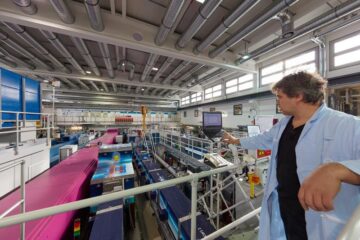Square Kilometer Array: The international radio telescope for the 21st century

The SKA is a USD 1 billion+ international project to create a radio telescope incorporating a receiving surface of a million square metres, fifty times larger than the biggest receiving surface now in existence. This huge surface will be composed of many small antennas, divided into a dense inner core array which becomes more diffuse with increasing radius.
The SKA was conceived as a new international project to meet the future needs of radio astronomers. It will be use to address some of the more fundamental questions in contemporary physics and astronomy, including the nature of the first stars in the Universe, the cosmic history of the Universe, the nature of Dark Matter and Dark Energy, theories of gravity and black holes and the origin of cosmic magnetism.
Beside the major scientific value of this project, experts expect large benefits in terms of direct economic and indirect societal impacts, such as boosting technological learning, capacity-building, socio-economic benefit as well as stimulation of market gains.
Organised by COST (European Cooperation in Science and Technology) with the support of INAF (Italian National Institute of Astrophysics), this strategic workshop is aimed at improving the understanding of boundary conditions and exchanging best practices that will positively influence SKA policy.
Speakers at this workshop include the Presidency of INAF and COST, academics from the University of Manchester, Trinity College Dublin, Leiden University and Imperial College London. Mr Adolfo Urso, Italy's Deputy Minister for Economic Development, will be addressing the closing remarks.
Workshop attendees have been selected amongst industry representatives with experience in large-scale technology projects, Governments' officials working on research and innovation policy and funding, representatives from leading universities and research institutes, as well as experts working on the SKA projects and precursor activities.
Media Contact
Weitere Informationen:
http://www.cost.euAlle Nachrichten aus der Kategorie: Seminare Workshops
Neueste Beiträge

Bakterien für klimaneutrale Chemikalien der Zukunft
Forschende an der ETH Zürich haben Bakterien im Labor so herangezüchtet, dass sie Methanol effizient verwerten können. Jetzt lässt sich der Stoffwechsel dieser Bakterien anzapfen, um wertvolle Produkte herzustellen, die…

Batterien: Heute die Materialien von morgen modellieren
Welche Faktoren bestimmen, wie schnell sich eine Batterie laden lässt? Dieser und weiteren Fragen gehen Forschende am Karlsruher Institut für Technologie (KIT) mit computergestützten Simulationen nach. Mikrostrukturmodelle tragen dazu bei,…

Porosität von Sedimentgestein mit Neutronen untersucht
Forschung am FRM II zu geologischen Lagerstätten. Dauerhafte unterirdische Lagerung von CO2 Poren so klein wie Bakterien Porenmessung mit Neutronen auf den Nanometer genau Ob Sedimentgesteine fossile Kohlenwasserstoffe speichern können…





















